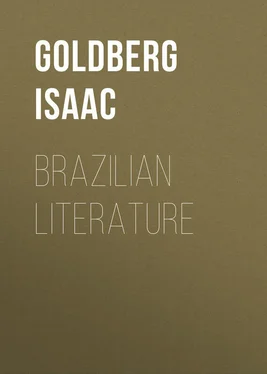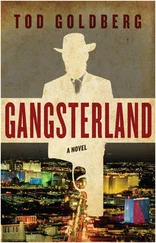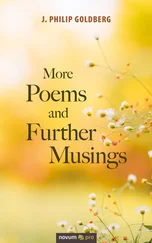Isaac Goldberg - Brazilian Literature
Здесь есть возможность читать онлайн «Isaac Goldberg - Brazilian Literature» — ознакомительный отрывок электронной книги совершенно бесплатно, а после прочтения отрывка купить полную версию. В некоторых случаях можно слушать аудио, скачать через торрент в формате fb2 и присутствует краткое содержание. Жанр: foreign_antique, foreign_prose, на английском языке. Описание произведения, (предисловие) а так же отзывы посетителей доступны на портале библиотеки ЛибКат.
- Название:Brazilian Literature
- Автор:
- Жанр:
- Год:неизвестен
- ISBN:нет данных
- Рейтинг книги:4 / 5. Голосов: 1
-
Избранное:Добавить в избранное
- Отзывы:
-
Ваша оценка:
- 80
- 1
- 2
- 3
- 4
- 5
Brazilian Literature: краткое содержание, описание и аннотация
Предлагаем к чтению аннотацию, описание, краткое содержание или предисловие (зависит от того, что написал сам автор книги «Brazilian Literature»). Если вы не нашли необходимую информацию о книге — напишите в комментариях, мы постараемся отыскать её.
Brazilian Literature — читать онлайн ознакомительный отрывок
Ниже представлен текст книги, разбитый по страницам. Система сохранения места последней прочитанной страницы, позволяет с удобством читать онлайн бесплатно книгу «Brazilian Literature», без необходимости каждый раз заново искать на чём Вы остановились. Поставьте закладку, и сможете в любой момент перейти на страницу, на которой закончили чтение.
Интервал:
Закладка:

The fourth division allows for the decidedly eclectic tendencies subsequent upon the decline of Romanticism.
Accordingly, the four chapters that follow will deal succinctly with these successive phrases of the nation’s literature. Not so much separate works or men as the suffusing spirit will engage our attention; what we are here interested in is the formation and development of the Brazilian imaginative creative personality and its salient products. 26 26 This by no means implies acceptance of Romero’s critical standards. See, for details, the Selective Bibliography at the back of the book.
CHAPTER II
PERIOD OF FORMATION (1500-1750)
The Popular Muse – Sixteenth Century Beginnings – Jesuit Influence – Seventeenth Century Nativism – The “Bahian” school – Gregorio de Mattos Guerra – First Half of Eighteenth Century – The Academies – Rocha Pitta – Antonio José da Silva.
It is a question whether the people as a mass have really created the poetry and legends which long have been grouped under the designation of folk lore. Here, as in the more rarefied atmosphere of art, it is the gifted individual who originates or formulates the central theme, which is then passed about like a small coin that changes hands frequently; the sharp edges are blunted, the mint-mark is erased, but the coin remains essentially as at first. So that one may agree only halfway with Senhor De Carvalho, 27 27 Op. Cit. P. 51.
when he writes that “true poetry is born in the mouths of the people as the plant from wild and virgin soil. The people is the great creator, sincere and spontaneous, of national epics, the inspirer of artists, stimulator of warriors, director of the fatherland’s destinies.” The people furnishes rather the background against which the epics are enacted, the audience rather than the performers. Upon the lore and verses of their choosing they stamp the distinguishing folk impress; the creative inspiration here, as elsewhere, is the labour of the salient individual.
The study of the Brazilian popular muse owes much to the investigations of the tireless, ubiquitous Sylvio Romero, whom later writers have largely drawn upon. 28 28 See his Cantos Populares do Brasil , Contos Populares do Brasil , Estudos sobre a Poesia Popular Brasileira . These works he summarizes in Chapter VII, Volume I, of his Historia da Litteratura Brasileira, 2a Edição melhorada pelo auctor . Rio de Janeiro, 1902.
There are no documents for the contributions of the Africans and few for the Tupys, whom Romero did not credit with possessing a real poetry, as they had not reached the necessary grade of culture. The most copious data are furnished, quite naturally, by the Portuguese. Hybrid verses appear as an aural and visible symbol of the race-mixture that began almost immediately; there are thus stanzas composed of blended verses of Portuguese and Tupy, of Portuguese and African. Here, as example, is a Portuguese-African song transcribed by Romero in Pernambuco:
Você gosta de mim,
Eu gosto de você;
Se papa consentir,
Oh, meu bem,
Eu caso com você…
Alê, alê, calunga,
Mussunga, mussunga-ê.
Se me dá de vestir,
Se me dá de comer,
Se me paga a casa,
Ob, meu bem,
Eu moro com você…
Alê, alê, calunga,
Mussunga, mussunga-ê. 29 29 The frank, practical song, minus the African refrain, runs thus: “You like me and I like you. If pa consents, oh my darling, I’ll marry you… If you’ll give me my clothes and furnish my food, if you pay all the household expenses, oh, my darling, I’ll come to live with you.”
On the whole, that same melancholy which is the hallmark of so much Brazilian writing, is discernible in the popular refrain. The themes are the universal ones of love and fate, with now and then a flash of humour and earthy practicality.
Romero, with his excessive fondness for categories (a vice which with unconscious humour he was the very first to flagellate), suggested four chief types of popular poetry, (1) the romances and xacaras , (2) the reisados and cheganças , (3) the oraçoes and parlendos , (4) versos geraes or quandrinhas . In the same way the folk tales are referred to Portuguese, native and African origin, with a more recent addition of mestiço (hybrid, mestee) material. “The Brazilian Sheherezade,” writes De Carvalho, 30 30 Op. Cit. P. 58.
“is more thoughtful than opulent, she educates rather than dazzles. In the savage legends Nature dominates man, and, as in the fables of Æsop and La Fontaine, it is the animals who are charged with revealing life’s virtues and deficiencies through their ingenious wiles… To the native, as is gathered from his most famous tales, skill was surely a better weapon than strength.” Long ago, the enthusiastic Denis, the first to accord to Brazilian letters a treatment independent of those of Portugal, 31 31 Résumé de l’histoire Littéraire du Portugal suivi du Résumé de l’histoire littéraire du Brésil. Ferdinand Denis. Paris, 1826. The Brazilian section occupies pages 513-601.
had commented on the blending of the imaginative, ardent African, the chivalrous Portuguese, and the dreamy native, and had observed that “the mameluco is almost always the hero of the poetic tales invented in the country.” For, underneath the crust of this civilization flows a strong current of popular inspiration. At times, as during the Romantic period, this becomes almost dominant. “We all, of the most diverse social classes,” avers De Carvalho, “are a reflection of this great folk soul, fashioned at the same time of melancholy and splendour, of timidity and common sense. Our folk lore serves to show that the Brazilian people, despite its moodiness and sentimentality, retains at bottom a clear comprehension of life and a sound, admirable inner energy that, at the first touch, bursts forth unexpected and indomitable.” This is, perhaps, an example of that very sentimentality of which this engaging critic has been speaking, for the folk lore of most nations reveals precisely these same qualities. For us, the essential point is that Brazilian popular poetry and tale exhibit the characteristic national hybridism; the exotic here feeds upon the exotic. 32 32 For an enlightening exposition of the Portuguese popular refrain known as cossantes , see A. F. G. Bell’s Portuguese Literature , London, 1922, pages 22-35. Their salient trait, like that of their Brazilian relative, is a certain wistful sadness.
The sixteenth century, so rich in culture and accomplishment for the Portuguese, is almost barren of literature in Brazil. A few chroniclers, the self-sacrificing Father Anchieta, the poet Bento Teixeiro Pinto, – and the list is fairly exhausted. These are no times for esthetic leisure; an indifferent monarch occupies the throne in Lisbon for the first quarter of the century, with eyes turned to India; in the colony the entire unwieldy apparatus of old-world civilization is to be set up, races are to be exterminated or reconciled in fusion, mines lure with the glitter of gold and diamonds; a nationality, however gradually and unwittingly, is to be formed. For, though the majority of Portuguese in Brazil, as was natural, were spiritually inhabitants of their mother country, already there had arisen among some a fondness for a land of so many enchantments.
Читать дальшеИнтервал:
Закладка:
Похожие книги на «Brazilian Literature»
Представляем Вашему вниманию похожие книги на «Brazilian Literature» списком для выбора. Мы отобрали схожую по названию и смыслу литературу в надежде предоставить читателям больше вариантов отыскать новые, интересные, ещё непрочитанные произведения.
Обсуждение, отзывы о книге «Brazilian Literature» и просто собственные мнения читателей. Оставьте ваши комментарии, напишите, что Вы думаете о произведении, его смысле или главных героях. Укажите что конкретно понравилось, а что нет, и почему Вы так считаете.












